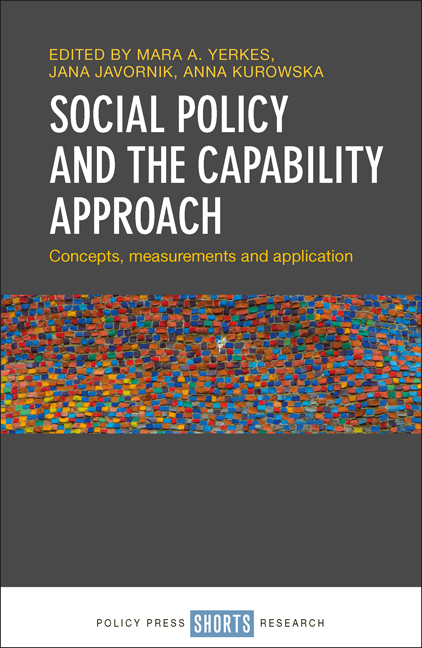Book contents
- Frontmatter
- Contents
- List of figures and tables
- Notes on the editors
- Notes on contributors
- one Rethinking social policy from a capability perspective
- two Education as investment? A comparison of the capability and social investment approaches to education policy
- three From ‘active’ to ‘capable’: a capability framework for policy and practice on ageing and later life
- four Converting shared parental leave into shared parenting: the role of employers and use of litigation by employees in the UK
- five Comparative social policy analysis of parental leave policies through the lens of the capability approach
- six Ask rather than assume: the capability approach in the practitioner setting
- seven Social investment, human rights and capabilities in practice: the case study of family homelessness in Dublin
- eight From the capability approach to capability-based social policy
- Index
three - From ‘active’ to ‘capable’: a capability framework for policy and practice on ageing and later life
Published online by Cambridge University Press: 30 April 2022
- Frontmatter
- Contents
- List of figures and tables
- Notes on the editors
- Notes on contributors
- one Rethinking social policy from a capability perspective
- two Education as investment? A comparison of the capability and social investment approaches to education policy
- three From ‘active’ to ‘capable’: a capability framework for policy and practice on ageing and later life
- four Converting shared parental leave into shared parenting: the role of employers and use of litigation by employees in the UK
- five Comparative social policy analysis of parental leave policies through the lens of the capability approach
- six Ask rather than assume: the capability approach in the practitioner setting
- seven Social investment, human rights and capabilities in practice: the case study of family homelessness in Dublin
- eight From the capability approach to capability-based social policy
- Index
Summary
Introduction
Population ageing has raised several critical issues for multiple social policy domains, including pensions, healthcare and longterm care. In the European Union (EU), the dominant policy framework designed to address the challenges of population ageing is called ‘active ageing’ (AA). There is no consensus around what exactly AA means, but it usually refers to the idea of exhorting older people to engage in relevant economic and social activities and to be independent and autonomous. The ‘Council Declaration on the European Year for Active Ageing and Solidarity between Generations’ (Council of the European Union, 2012), hereinafter referred to as ‘Council Declaration’, expects that the EU policy on AA will improve productivity, enhance solidarity between generations and contribute to promoting employment and reducing poverty and social exclusion, helping in this way to meet the targets of the Europe 2020 Strategy.
However, the EU policy on AA exhibits several limitations that compromise the promotion of the older people's wellbeing and quality of life. This chapter proposes the adoption of an alternative framework for developing policies and practices to deal with the challenges of population ageing. This framework is based on the capability approach (CA) and is constituted by eight principles that, taken as a whole, shift the ‘normative reference point’ (see Chapter One, this volume) from activity (mainly economic and social activity) to the real opportunities older people have (their capabilities) to do what they value and be the persons they want to be. In the ambit of this framework, policy and professional practice must focus on the promotion of the older people's wellbeing by intervening in those factors that enhance/undermine their capabilities. This entails a more flexible, multidimensional and more supportive approach to old-age policy, without imposing a priori importance on certain policy domains and without an exclusive focus on individual responsibility.
European Union policy on active ageing
Although we can establish the European Year of Older People, in 1993, as the first milestone in the emergence of a specific EU policy on AA (due to the emphasis that was put on the theme of older people's active participation in society), we had to wait almost 20 years to see the definitive institutionalisation of this policy with the celebration, in 2012, of the European Year for Active Ageing and Solidarity between Generations.
- Type
- Chapter
- Information
- Social Policy and the Capability ApproachConcepts, Measurements and Application, pp. 41 - 60Publisher: Bristol University PressPrint publication year: 2019



